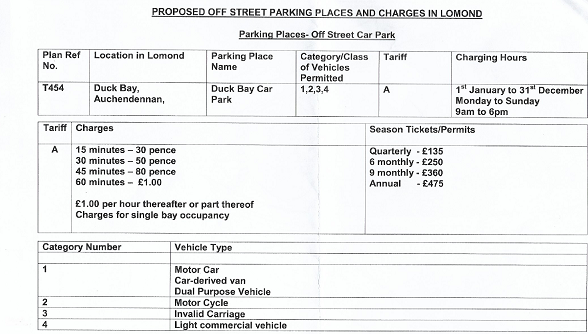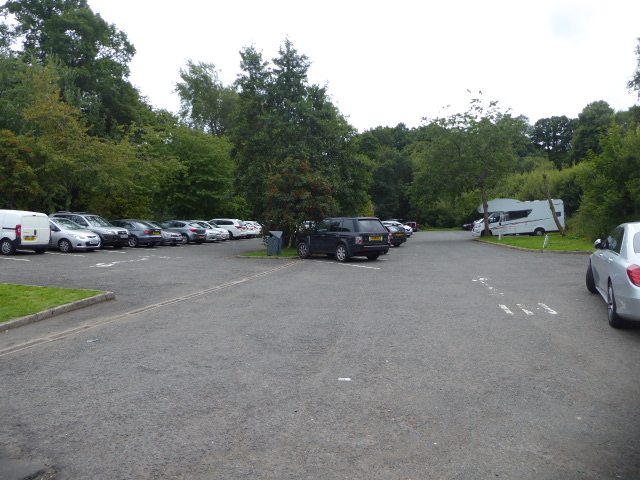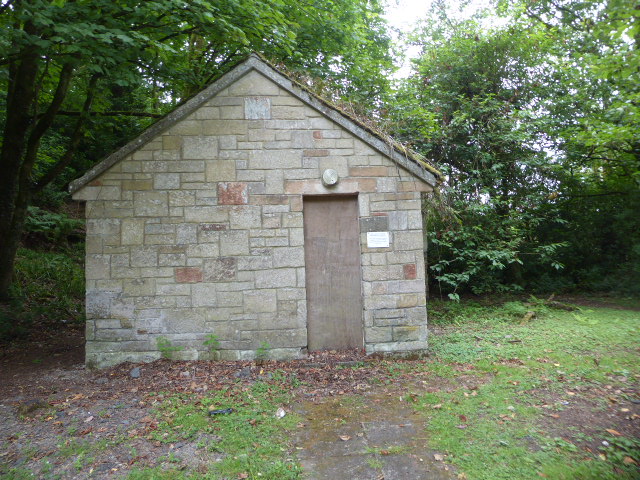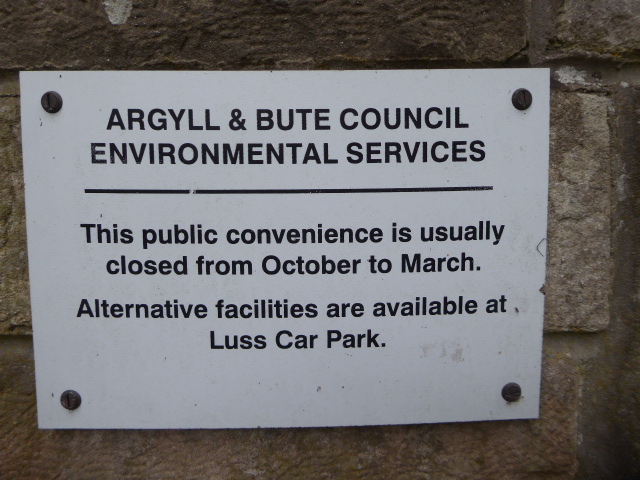
While Argyll and Bute Council’s decision to raise car parking charges at Arrochar by 800% (see here), has received much media attention, it also transpires that they intend to introduce this level of charges at their car park in Duck Bay, one of the most popular places for visitors on the west shore of Loch Lomond. This follows the introduction of a similar charging regime at Luss last year. Some of the background to this decision was given in an excellent article by the Lochside Press in early August (see here) which revealed that Argyll and Bute Council hoped to raise £90,000 a year from the new charges at Arrochar to compensate for central government cuts. Whether this amount of money will be raised of course is another question. Not many hillwalkers and other visitors will be prepared to fork out up to £9 a day, the sort of charge you might pay in a town centre, to enjoy the countryside and are likely to move elsewhere, shunting the costs of visitor management onto other landowners.
The position at Duck Bay
 While Argyll and Bute now apparently owns the car park at Duck Bay, people also park along the shore road and its quite predictable that unless plans are also afoot to charge for parking along what is a public road, people will park there and, if there are no free places, will move elsewhere. This will create further traffic chaos both at Duck Bay and at the junctions with the A82.
While Argyll and Bute now apparently owns the car park at Duck Bay, people also park along the shore road and its quite predictable that unless plans are also afoot to charge for parking along what is a public road, people will park there and, if there are no free places, will move elsewhere. This will create further traffic chaos both at Duck Bay and at the junctions with the A82.

The public toilets at Duck Bay have long been abandoned, a reminder of the times when Councils saw it as their responsibility to provide services for the public. Now they are run only with an eye only for budgets with no proper consideration of the consequences of decisions allegedly taken on financial grounds.

Argyll and Bute Council’s budget included no proposals to improve services, such as re-opening the toilets, with money raised from these charges. They are thus effectively a tax on access, whether by the “Day tripper” as at Duck Bay or the hillwalker as at Arrochar.
Argyll and Bute’s access tax and the National Park
Argyll and Bute Council decided to raise these charges for access at their budget meeting earlier this year. The Council is run by a minority Lib Dem administration but the budget was agreed with SNP support. The Council nominated two new councillors onto the Loch Lomond and Trossachs National Park Authority after the last Council elections, Ellen Morton who is part of the ruling Lib Dem administration and Barbara Morgan, who represents the SNP. Two councillors who now sit on the LLTNPA have therefore been involved in the decision to create what is effectively an access tax.
Both these councillors should in my view have ensured the LLTNPA was consulted before taking this decision because of the implications both for rights of access and visitor management. I suspect this never happened because Argyll and Bute has for years been failing to co-operate with the LLTNPA on simple issues such as providing sufficient litter bins and then emptying them at places like Duck Bay.
Among the serious implications of this decision are:
- There are now two members of the LLTNPA who apparently think charging £9 to park and enjoy the countryside is acceptable. That will make it far easier for the LLTNPA to increase the charges at its own car parks (such as Inveruglas and Balmaha) and for Forestry Commission Scotland to do so too.
- If these two councillors believe £9 is acceptable for car parking, then what do they think about charging £3 for a camping permit ? In their eyes that presumably seems ridiculously low and will open the way for the LLTNPA to increase its charges for permits (another charge on access).
- And if this doesn’t transpire and the two Councillors turn out to be in a minority, what does this say about joined up approaches to visitor managment? The LLTNPA was set up to ensure an integrated approach to visitor management and clearly totally failed to do this with vastly different charges and services in place across the National Park. The model of councils being represented on our National Park Boards to ensure joined up working has failed miserably.
What needs to happen
The SNP Government’s response to Edinburgh City Council’s proposal for a tourist tax to help pay for the infrastructure in the city which supports tourism has been negative. They have claimed it would deter tourists. On this logic they should be stepping in now to overturn Argyll and Bute’s decision to tax access, although in my view it is equally important they do so to protect our freedom to roam and to ensure joined up visitor management. If you cannot get to places for a reasonable cost, then there is de facto freedom of access only for those who can afford to pay exorbitant changes. If you don’t know what to expect in terms of charges, what will that do for tourism?
Meantime however we need the LLTNPA to take a lead on this. I would like to see them debate the issue of car parking charges at their next meeting, ask Argyll and Bute Council to reverse their decision and then develop a policy on car parking charges across the National Park based on the principle that any car parking charges should clearly relate to the costs of providing visitor infrastructure in the place concerned. Whether the new Board will have the courage to do this remains to be seen.
If you want to add your voice to those protesting against the charges there is a petition about Arrochar here

Correction: We have a “right” to roam. The Land Reform (Scotland) Act 2003 had the effect of converting an existing “freedom” to take access over most of Scotland’s land and water into a “right of access”. One consequence is the obligation placed on public bodies to take action to protect that right and to facilitate the exercise of the right. Imposing parking charges without the provision of associated facilities (eg toilets) could be regarded as a failure to meet that obligation. It discriminates against those on low incomes and is a potential hindrance to the exercise of access rights on adjacent ground or water. Furthermore it would appear to be contrary to Scottish Government policies which encourage more people to take outdoor exercise in the countryside. The solution is simple – anyone who objects to the charge can just park on the roadside, so long as there is no clearway order in place and they are not causing an obstruction. If passing traffic has to slow down that does not constitute an obstruction and may be a welcome constraint on speeding motorists. Such an approach needs to be applied throughout the Argyll and Bute Council area as they have clearly admitted that the main purpose of the car parking charges is to raise money for the Council budget and bears no relationship to the requirements of the specific locations where they are applying these charges.
There may need to be an amendment to the above legislation so that at least public bodies such as the Forestry Commission, along with local and national park authorities, are prohibited from applying car park charges in countryside locations, unless approved by the Local Access Forum. Where such charges are approved the LAF should then be responsible for the allocation of any funds raised from the car park charges, with the requirement that the funds must be spent on supporting access rights on land or water adjacent to the car park, on the management of the existing vehicular parking or the provision of additional vehicular parking space.
Surely this sort of action is clearly counter to the Scottish Outdoor Access Code and therefore questionably legal.
The Scottish Outdoor Access Code represents in layman’s language the rights and obligations we have under the right to roam law. It is recognised in that law. It is available on the Scottish Outdoor Access Code web site (https://www.outdooraccess-scotland.scot/). It’s interesting that a relatively recent paper published on that site captures a relevant discussion (and recommendations based on the access code) relating to parking issues (see https://www.outdooraccess-scotland.scot/sites/soac/files/docs/paper_on_parking_issues_for_national_access_forum_-27_september_2017.pdf). It includes some interest Annexes that capture contributes from various well established organisations – e.g. Scottish National Heritage are quoted like this
“We understand that the provision of car parking facilities incurs a cost, and appreciate that reasonable charging for car parking is an appropriate mechanism to recoup some of the money invested in the provision of these facilities whilst also contributing to their upkeep.
However, we believe that where land is owned by the Scottish Government, local authority or government agency that car parking for outdoor activities should be provided at no charge or a small, affordable charge. Our rationale is that we believe that the government should be contributing to, and supporting, local economies, especially tourism as the main industry in Scotland. Low or no cost parking also supports government strategies relating to inclusivity, encouraging healthy living and preventative spend.”
Andrew this is spot on. People could send copies of the documents you refer to to local politicians etc and ask them to reconsider their views.